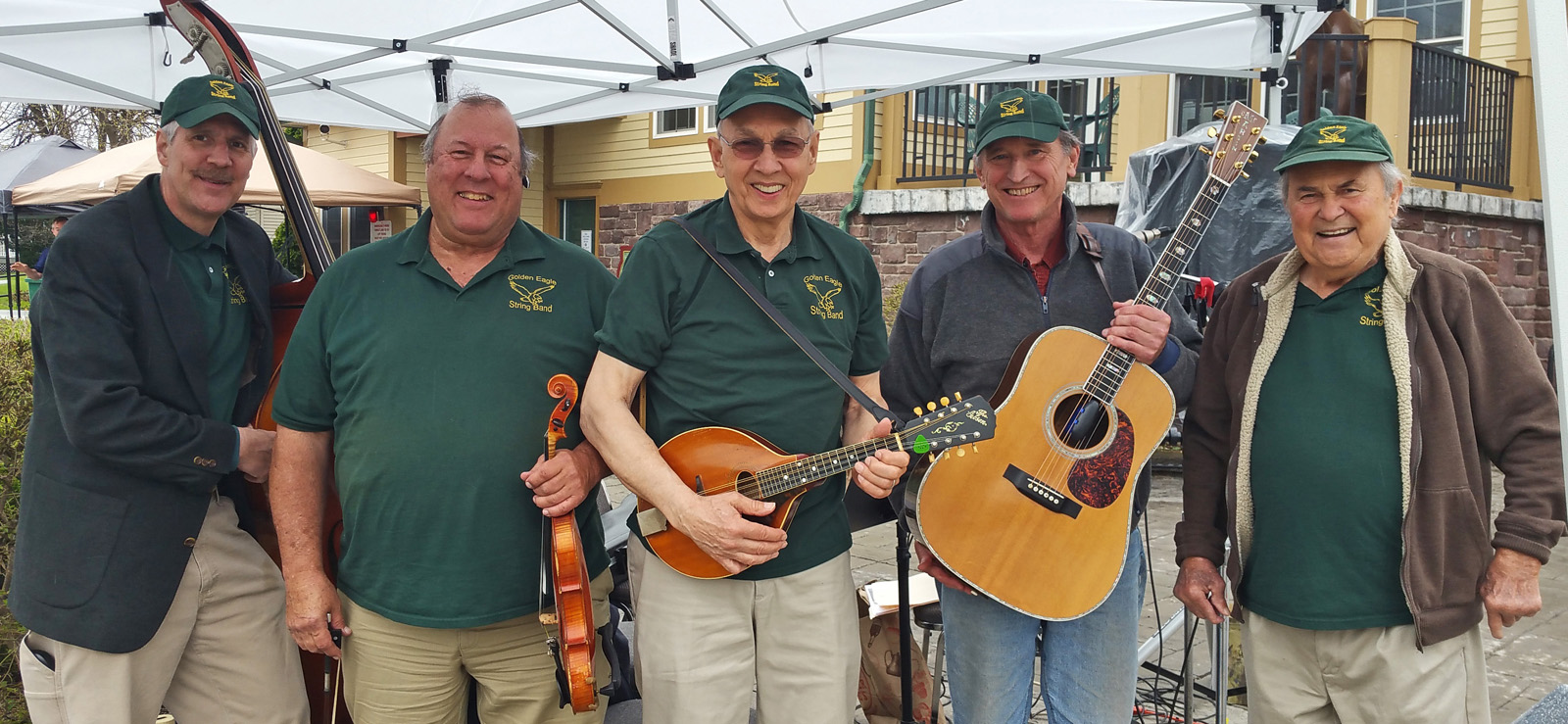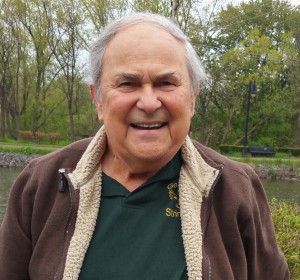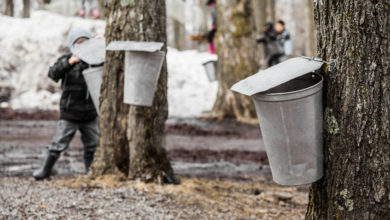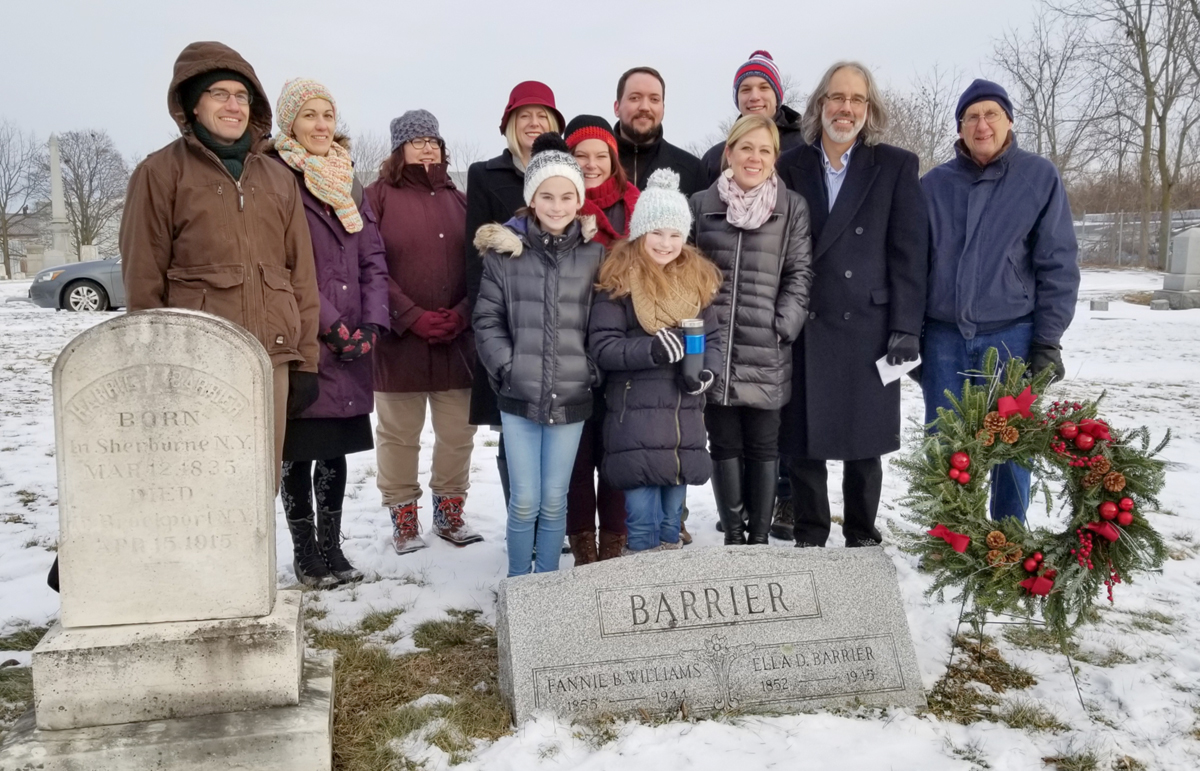Bill Hullfish delves into history and delivers folksongs of the waterways

“Performing the songs is the only way to excite people about history.”
Bill Hullfish, at 79, is a living legend in his own time. For 38 years, with the Golden Eagle String Band, which he started at The College at Brockport, he has researched and played the folk music of the Erie Canal and other waterways. Performing in the Northeastern U.S. since 1978, the band has appeared at a vast array of regional festivals, universities and museums, and community historic celebrations. They have recorded for Smithsonian/Folkways, toured under a grant from the National Endowment for the Arts, and received a gold medal from the Smithsonian Institute
As a college student, Bill showed his passion to get out into the world to play music. “I was restless to play my clarinet, any kind of jobs or orchestras I could get into,” he said about his state of mind as a junior at the University of Maryland. He passed the audition for Marine Corps Band, turned down their offer, and joined the Air Force Band. He loved singing in college and also made the Air Force Singing Sergeants. With both talents, he went on State Department tours in the U.S. and around the world for six years. “I was only 19 and finally living my dream,” Bill said.
Bill eventually earned a B.A. and M.A. in music at the University of Maryland, plus an Ed.D. at University of Buffalo, through Air Force benefits. With job offers from three colleges, his advisor strongly advised him to accept the offer from The College at Brockport. He started at Brockport in 1963.
“Best class ever” becomes Golden Eagle String Band
Bill says he was teaching strictly classical music and playing clarinet in summer orchestras. In the 1970’s he decided to teach a class on folk music with a concentration on New York. “I just lucked into one of the best classes of students I ever had,” he said about his class in 1978. With all older students, one played banjo, another played dobro and guitar, and two others played dulcimer and mandolin. “I said this is an opportunity of a lifetime,” Bill recalls.
“I sent these students out looking for folk music, local stuff, especially canal songs. They gathered songs that we played in class. We named our group ‘The Golden Eagle String Band’ for the College mascot. That was one of my most exciting years, performing as well as researching,” Bill said, adding, “I don’t think I ever had a class like that again.” He still has one original class member in the band 38 years later.

Bill Hullfish. Photo by Dianne Hickerson
Bill and the band researched and played folksongs about fabled characters such as Sam Patch, whose last feat of bravado was to leap to his death into the Genesee Falls in Rochester. “The Blue Eagle Jail” was a song about the Monroe County jail with words that Dan Rice had written on a cell wall. Arch Merrill published the words, but, through years of investigation, Bill traced the original tune. Asked about the importance of recovering lost songs, Bill responded, “To get them played; that’s the only way they’re really enjoyed. It’s fairly easy to find the words, but performing the songs is the only way to excite people about history.”
Songs of the waterways
With a strong focus on the Erie Canal, Bill’s band also plays folk music from various inland waterways. They have played several years at the annual Sea Music Symposium and Festival at Mystic Seaport in Massachusetts where waterways music is featured. “I research every source, from books, to newspapers, and elsewhere,” he said, including songs about canals and rivers in New Jersey, Pennsylvania, Ohio, Delaware and New York.
Why do the inland waterways interest him? “I love the folk music from the 19th century,” he said. “The height of the canal era is probably 1830 to 1880, a wonderful era that Stephen Foster and Mark Twain wrote about.” Bill affirms that the waterways were key in building the United States. “The railroads took over,” he said, “but the early development was almost solely through the canals; all of upstate New York grew because of the canal.”
In 1981, with his band just two years old, Bill received a highly competitive grant from the National Endowment for the Arts to tour the Erie Canal by boat and perform. They boarded The Tigress, an old touring yacht, and traveled the Oswego Canal and the western Erie Canal playing in the canal towns.
More recently, Bill has arranged a little-known canal song, “DeWitt Clinton’s Grand Canal March,” for the Brockport Symphony Orchestra; it was performed in a concert in early May. The piece was written by the director of the West Point Band and originally played for Governor DeWitt Clinton at Erie Canal celebrations in 1823 and 1825. Bill found the march in a piano score in the Johns Hopkins Library web site and arranged it for orchestra.
“Low Bridge, Everybody Down” – Analysis of the classic in a coming book
At the New York Folklore Society meeting at the Canal Museum in Syracuse in 2012, Bill was one of four folklore panelists discussing “Low Bridge, Everybody Down.” “I was shocked at what little information came out from the other three panelists,” Bill said about the panel that discussed questions such as who was the real author. “I had a vague idea of Thomas S. Allen, the composer, and of changes that occurred as it came into the folk repertoire,” he said. “I knew there had to be more information somewhere,” prompting his research for two years.
One of the mysteries solved was why a Boston composer would write a song about the Erie Canal. He found that Allen did visit Rochester when the canal was switching to the barge system and being re-routed past Rochester. “That’s when he wrote the nostalgic song,” Bill said. Another characteristic that ties the “Low Bridge” song to Allen was his typical writing style of popular songs, starting in a minor key and ending in a major key in the chorus, seen clearly in “Low Bridge, Everybody Down.”
“I have looked at all aspects of the piece: When written, why written, the man who wrote it, and the musical style it was written in,” Bill said. It was the missing information on the Syracuse discussion panel that inspired Bill to research the song.
Bill’s research on the famous canal song is covered in the first three chapters of his book under way, Low Bridge, Everybody Sing: Songs of America’s Canals. The other six chapters cover the background of other canal songs, including when written, who wrote them and their place in the culture. One chapter includes a “Raging Canal” genre that was popular in sensationalizing the adventures on canal waters. Another chapter, “From Stage to Canal to Stage,” portrays how canal music created popular music, and vice versa.
In retirement: Still remarkable and remembered in a public mural
Bill retired from the College at Brockport in 2012. Now at age 79, he has been playing with the Brockport Symphony Orchestra for 35 years. The symphony recently performed the DeWitt Clinton Grand March, which Bill arranged for the orchestra. And, for 15 years now, he has played big band music of the ‘40’s with baritone sax and clarinet in the Gate Swingers Band, and has arranged music for the female vocalist. He also continues with the Golden Eagle String Band with fewer engagements by choice, playing about once a month.
Like the lad at 19 who said, “I am finally living my dream,” Bill now says, “I am doing exactly what I wanted to do in retirement: play music, read, and write.” Bill will not fade away. His primary legacy is perpetuated in the new mural at Brockport’s Sagawa Park entitled “Portraits of our Past.” Bill and the Golden Eagle String Band appear with other laudable figures who, over the years, have contributed to the riches of Brockport and the Erie Canal.



